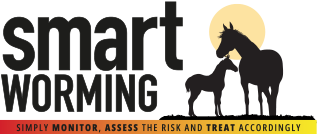Is your horse young?
Some protective immunity is usually acquired with age and exposure to certain worms, so older horses are usually at a lower risk than younger horses.
Parascaris equorum (roundworms) are generally only a concern in foals and youngstock.
Encysted redworms are rarely a problem in horses over 5 years of age.
Are your horses grazed with young horses?
Older horses with higher immunity can still develop high worm burdens if they are grazed with youngstock who are shedding high numbers of worm eggs into the environment.
Are your horses grazed with lots of other horses?
More horses in the environment means more worm eggs will be shed, which means more larvae on the pasture, resulting in higher worm burdens.
Are the fields poo-picked less than twice a week?
Worm eggs in the droppings take a few days to develop into infective larvae. Less poo-picking means more larvae on the pasture resulting in higher worm burdens.
Have your horses historically had repeated high faecal egg counts?
Some horses will naturally be high egg shedders that need deworming frequently, others are low shedders that can be dewormed less frequently.
The more questions you answer yes to, the higher the risk of your horse developing a significant worm burden.
